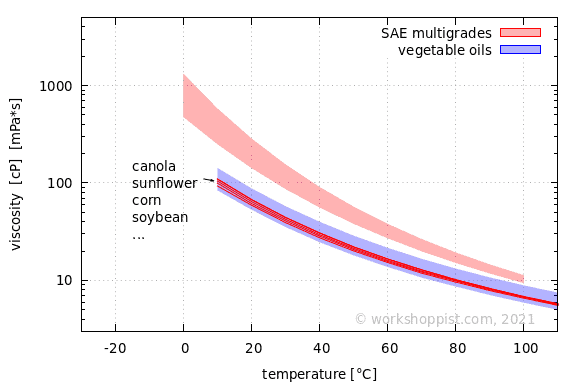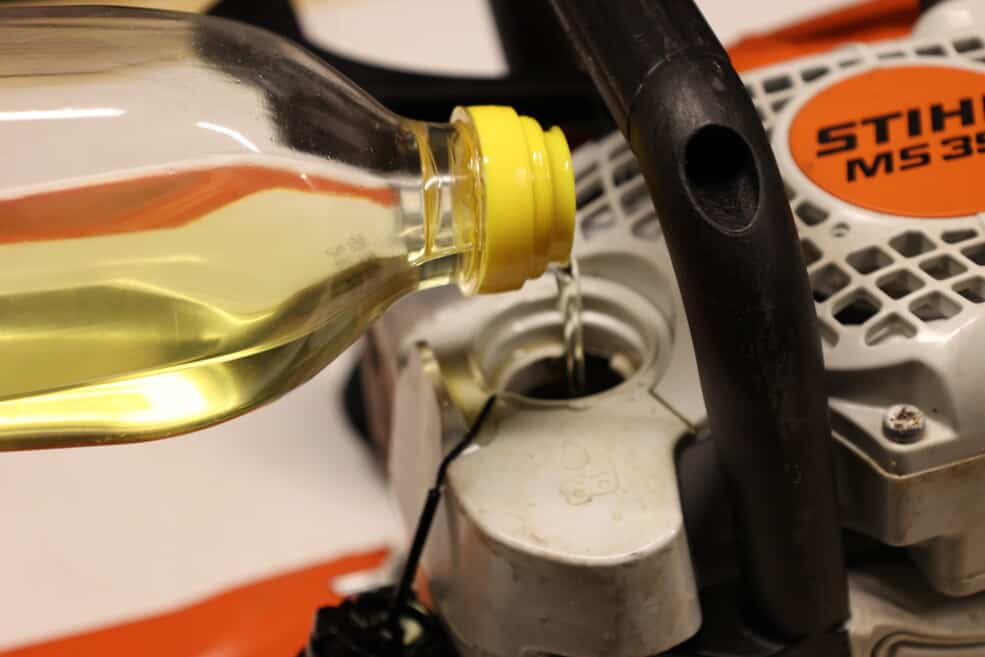In a previous post, we discussed alternatives to bar oil. Vegetable oils were clearly the low-cost champion. But how to choose a vegetable oil for guide bar lubrication? Which of them work the best and why? And which you should not use?
In this article, I rank the common vegetable oils for use as bar oil substitutes based on performance and cost. Whether you are looking for a vegetable oil for bar&chain to save money, protect the environment or as a quick fix, you will find the answer you are looking for below.
NB. This article is about plain, pure vegetable oils you can buy from the grocery store. For biological or vegetable-based bar oil products, see notes below.
Ranking
| VEGETABLE OILS FOR BAR & CHAIN | Performance | Viscosity @ 40/100°C [mPa*s] | Cloud/ Pour point | Cost* [$/gal] |
|---|---|---|---|---|
| 1 Canola oil (rapeseed) | best stability, low cost | 35/9 | +30°/-4°F (-1°/-20°C) | 7…13 |
| 2 Soybean oil (“Vegetable”) | good stability, lowest cost | 28/7 | +28°/-1°F (-2°/-19°C) | 6…8 |
| 3 Corn oil | summer use only, low cost | 29/8 | +37°/+15°F (+3°/-10°C) | 8…16 |
| 4 Sunflower oil, high-oleic | good stability, expensive | 31/7 | +34°/+0°F (+1°/-18°C) | 18…29 |
| 5 Olive oil | summer use only, expensive | 40/10 | 25…45 | |
| *7/2021, 1 gal quantity |
1 Canola oil
Canola oil is overall winner – it is the best vegetable oil for use as bar oil. It has the best stability against oxidation, the lowest pour point (-4°F/-20°C) and it is affordable (down to ~$7/gal, 2nd lowest cost). Particularly attractive are the high-oleic versions (>70% mono-unsaturated fat), which are stabler than the standard canola oil.
2 Soybean oil
Soybean oil is the second-best vegetable oil for lubricating the chainsaw bar and chain. It has good stability, especially in the partially hydrogenated form, a relatively low pour point between +0°F…+15°F (the numbers vary a bit), and it is very cheap (~$6/gal).
Note that soybean oil is usually sold as “Vegetable oil”.
3 Corn oil
Corn oil is the 3rd best vegetable oil for use as bar oil – at least in North America. Compared to canola and soybean, its stability is worse because of the high poly-unsaturated fat content; pour point is also higher at around +15°F (-10°C). However, it is quite affordable (~$8/gal) and OK for summer use.
Others
Some other vegetable oils promise good performance but are too expensive to make for an economical bar oil replacement. These include sunflower oil (high-oleic), safflower oil (high-oleic) and olive oil (summer use). Their cost – upwards from $20/gal – makes them more expensive than premium commercial bar oil.
Ranking criteria
1 Low pour point
Pour point is the lowest temperature at which an oil can practically be poured out of a cup.
In general, an oil should only be used well above the pour point to ensure that it can be pumped and transported in the oil channels of the guide bar.
Vegetable oils have problematically high pour points between -4°F…+15°F (-20°C…-10°C) and may start to solidify at normal winter temperatures.
For winter use, look for a vegetable oil with as low a pour point as possible. Avoid oils with substantial saturated fatty acid content (“hard fats”) like palm and coconut oil; prefer oils of mostly unsaturated fatty acids (canola, safflower, soybean, sunflower).
2 Chemical stability
Vegetable oils are less stable than many technical oils: they oxidize and polymerize more easily, leading to gumming and loss of lubricity.
For bar oil, look for a vegetable oil that is as chemically stable as possible. The stablest oils are ones with predominantly mono-unsaturated, particularly oleic fatty acids (canola, safflower, high-oleic sunflower).
Avoid oils rich in poly-unsaturated fatty acids – these are the healthy omega-3 and omega-6 fats. While healthy, these fats oxidize easily, becoming rancid or polymerizing (drying). Low-oleic versions of sunflower and soybean oil become easily rancid and should be avoided; drying oils like linseed (flax), hemp and walnut oil are particularly unsuited as bar oil since they will gum up the entire bar oiler system.
3 Low cost
Low price is the main advantage of vegetable oils, and probably the reason you’d want to use them instead of commercial bar oil products.
But not all vegetable oils are cheaper than bar oil; olive oil, grapeseed oil and sunflower oil actually cost more than Stihl Platinum bar oil.
To get a clear economic advantage over most bar oil, look for vegetable oils cheaper than $10 per gallon. In most areas, only canola, corn and soybean oil qualify.
Vegetable oil Pros

- Stable viscosity: Common vegetable oils all have a very similar low viscosity that varies less with temperature (lower viscosity index) than even multi-grade engine oils (see graph above)
- Low cost: The number one advantage of vegetable oils as bar oil is price: at $6…8 per gallon, canola, soybean and corn oil are cheaper than commercial bar oil.
- Availability: Vegetable oils are in every grocery store; bar oil products only at home centers and small-engine stores.
- Environmentally friendly: Vegetable oils are safe and harmless to the user and the environment; they are also bio-degradable.
Vegetable oil Cons
Cold properties: Vegetable oils may become too stiff or even solid in the cold to work as bar oil in winter conditions (see more below).
Shelf/tank life: Vegetable oils become rancid faster than mineral-based oils and have a shorter storage and tank life; some vegetable oils may even dry.
Stickiness: Vegetable oils are often less sticky/tacky than commercial bar oil products and don’t stay on the chain as well through the sharp turn at the bar tip.
Winter use
Pure vegetable oils have only limited applicability as bar oil in cold winter conditions. The reason is crystallization: a part of the oil contents start to solidify, making the oil first very viscous, then solid.
A very viscous bar oil does not do its job and may damage the saw. The increased viscosity will make the oil pump’s job hard; a solid oil will jam the pump and may cause damage. Crystallized waxes in a cloudy oil may clog the oil filter. A very viscous oil will also increase the chain drag. Engine heat helps in the tank and pump, but comes late.
A safe rule of thumb: stay above the cloud point of the oil. The cloud point is the temperature at which the waxes in the oil start to crystallize and turn the oil from clear to cloudy in appearance. For the top three vegetable oils above – canola, soybean, corn – the cloud point is around +30°F (+0°C), give or take a few degrees.
Accepting risk, you may venture below the cloud point. But leave a good 15°F (10°C) margin to the pour point.
Vegetable oils vs. Bio-based bar oils?
Some commercial bar oil products (e.g. Stihl BioPlus) have a vegetable base oil. How are these different from the plain vegetable oils like canola oil?
Commercial biological bar oils are most likely processed vegetable oils with additives. The compositions are proprietary, but we can guess that the base oils are high-oleic, hydrolyzed, perhaps de-waxed; additives probably include anti-oxidants, a tackifier, pour point depressants.
Thanks to the treatments and additives, biological bar oils store longer, work in colder temperatures and perhaps lubricate better than pure vegetable oils discussed above.
Which vegetable oils not to use as bar oil?
While experimenting with different vegetable oils in your saw is mostly fine, there are some vegetable oils are wholly unsuited for use as bar oil. These will get you into trouble and are best avoided outright. Here’s a list:
1 Drying oils
Least suited are drying oils like linseed (flax), tung and walnut oil. These oils, typically high in poly-unsaturated fats, are susceptible to polymerization, i.e. hardening, when in contact with air. Drying oils work for a while, but eventually clog up the oil channels and glue the chain to the bar.
2 “Hard oils”
Another group of vegetable oils not suited for bar oil use are oils high in saturated fatty acids – that is “hard fats”. These oils have very high pour points and may become solid around room temperature – they may pour in nicely inside or in hot weather, but solidify and jam your oiler when it gets a bit colder. Examples include coconut, palm, and (to some extent) peanut oil.
3 Unfiltered oils
A third group of unsuited oils is unfiltered vegetable oils. The particulate matter in these oils, often sold as organic or unrefined oil, fouls the oil channels and may clog your filter.
